
Birt Acres was an American and British photographer and film pioneer. Among his contributions to the early film industry are the first working 35 mm camera in Britain (Wales), and Birtac, the first daylight loading home movie camera and projector. He also directed a number of early silent films.

Robert William Paul was an English pioneer of film and scientific instrument maker.
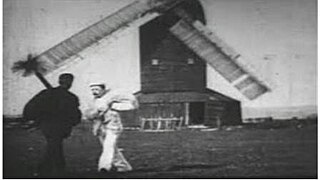
The Miller and the Sweep is a 1898 British short black-and-white silent comedy film, directed by George Albert Smith, featuring a miller carrying a bag of flour fighting with a chimney sweep carrying a bag of soot in front of a windmill, before a crowd comes and chases them away. The film, according to Michael Brooke of BFI Screenonline, "was one of the first films made by G.A. Smith, shortly after he first acquired a camera," and is also, "one of the earliest films to show a clear awareness of its visual impact when projected."

Explosion of a Motor Car is a 1900 British silent comic trick film, directed by Cecil M. Hepworth, featuring an exploding automobile scattering the body parts of its driver and passenger. "One of the most memorable of early British trick films" according to Michael Brooke of BFI Screenonline, "was one of the first films to play with the laws of physics for comic effect." It features one of the earliest known uses in a British film of the stop trick technique discovered by French filmmaker Georges Méliès in 1896, and also includes one of the earliest film uses of comedy delay – later to be widely used as a convention in animated films – where objects take much longer to fall to the ground than they would do in reality. It is included in the BFI DVD Early Cinema: Primitives and Pioneers and a clip is featured in Paul Merton's interactive guide to early British silent comedy How They Laughed on the BFI website.
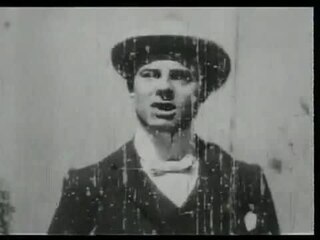
The Big Swallow is a 1901 British silent comic trick film, directed by James Williamson, featuring a man, irritated by the presence of a photographer, who solves his dilemma by swallowing him and his camera whole. The three-shot trick film is, according to Michael Brooke of BFI Screenonline, "one of the most important early British films in that it was one of the first to deliberately exploit the contrast between the eye of the camera and of the audience watching the final film".
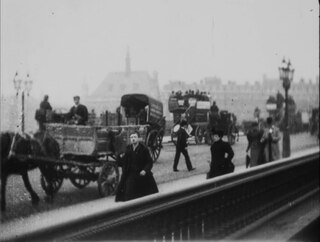
Blackfriars Bridge is an 1896 British short black-and-white silent actuality film, directed by Robert W. Paul, featuring top-hatted pedestrians and horse-drawn carriages passing over Blackfriars Bridge, London. The film was, according to Michael Brooke of BFI Screenonline, "taken from the southern end looking northwards over the Thames by R.W. Paul in July 1896," and, "screened as part of his Alhambra Theatre programme shortly afterwards, certainly no later than 31 August"

A Sea Cave Near Lisbon is an 1896 British short silent actuality film, directed by Henry Short, featuring a view looking out to sea through the Boca do Inferno cave near Lisbon, with waves breaking in. The film was popular with audiences and received positive reviews.

The Waif and the Wizard, also entitled The Home Made Happy, is a 1901 British silent comic trick film, directed by Walter R. Booth, featuring a magician using his magic to aid an ailing girl at the request of her brother. The film, "is rather less elaborate in terms of special effects than the other films that W.R. Booth and R.W. Paul made the same year," but, according to Michael Brooke of BFI Screenonline, "provides an excellent illustration of how effects used sparingly can often have more impact, especially when set in a suitable emotional context."
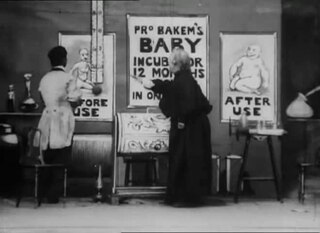
An Over-Incubated Baby is a 1901 British silent comic trick film, directed by Walter R. Booth, featuring a woman who gets an unpleasant surprise after placing her baby in Professor Bakem's baby incubator for 12 months growth in one hour. The film is, "one of the most original of the trick films made by W.R. Booth and R.W. Paul in 1901." According to Michael Brooke of BFI Screenonline, "one of the less elaborate films made by Booth and Paul that year, though the concept itself is so imaginative that it arguably didn't need any more than basic jump-cut transformations."

Cheese Mites, or Lilliputians in a London Restaurant is a 1901 British short silent trick film, directed by Walter R. Booth. A gentleman is entertained by the little people who emerge from the cheese at his table.
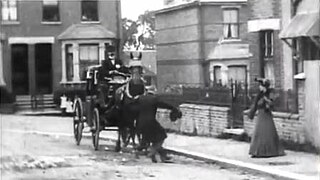
An Extraordinary Cab Accident is a 1903 British silent comic trick film, directed by Walter R. Booth, featuring a gentleman making a miraculous recovery after being trampled underfoot by a horse and cab. The film, "seems something of a step back," "compared with the elaborate special effects fantasies that director W.R. Booth and producer R.W. Paul had already concocted," but according to Michael Brooke of BFI Screenonline, "more complex special effects might well have worked against the impression Booth and Paul were clearly seeking to create, which is that of a man being genuinely run over by a horse-drawn cab, his body being knocked down and trampled by the horse's hooves."

The Twins' Tea Party is an 1896 British short silent actuality film, produced and directed by Robert W. Paul. The film "was one of the very first 'facials'," which according to Michael Brooke of BFI Screenonline was "a popular genre in early British cinema that exploited what to 1896 audiences was the astonishing novelty of being able to see moving images of recognisable people in medium close-up as they reacted to a particular situation." John Barnes, author of The Beginnings of the Cinema in England, adds that "this charming one-shot film of two infant girls reluctantly sharing tea was one of the most popular items exhibited in R.W. Paul's programmes at the Alhambra Theatre in 1896."

Two A.M.; or, the Husband's Return is an 1896 British short silent comedy film, produced by Robert W. Paul, featuring a drunken husband returning home late at night to the irritation of his wife. The film which, "was almost certainly sourced from a concurrent stage production," is according to Michael Brooke of BFI Screenonline, "a study in often quite risqué body language, with the husband the worse for drink, and the wife determined both to remonstrate with him and to get him undressed and into bed as quickly as possible."
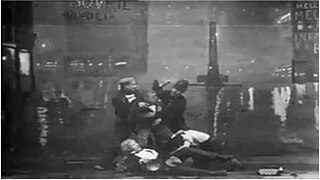
Footpads is a 1895 British short silent drama film that was directed by Robert W. Paul. It features a top-hatted pedestrian against a rainy London backdrop, who is assaulted by three footpads and rescued by a passing policeman.
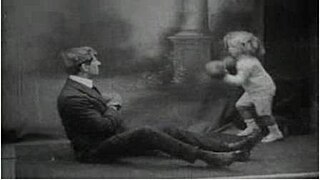
The Man to Beat Jack Johnson is a 1910 British short black-and-white silent comedy film, produced by the Tyler Film Company, featuring four-year-old Willy Sanders demonstrating his boxing and wrestling skills against an adult opponent.

The Biter Bit is an 1899 British short black-and-white silent comedy film, produced by Bamforth & Co Ltd, featuring a boy playing a practical joke on a gardener by grasping his hose to stop the water flow and then letting go when the gardener looks down it to check. The film "is an English remake" of Auguste and Louis Lumière's L'Arroseur Arrosé (1895), according to Michael Brooke of BFI Screenonline, "providing a good illustration of how early film production companies cheerfully plagiarised each other's work" with "a few minor differences between, most notably a rather greater sense of space and depth in the Bamforth version" and "three distinct planes to the action". It is included in the BFI DVD Early Cinema: Primitives and Pioneers and a clip is used in Paul Merton's interactive guide to early British silent comedy How They Laughed on the BFI website.
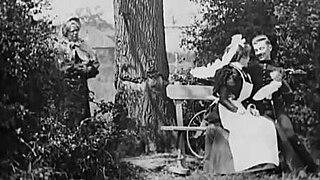
Tommy Atkins in the Park is an 1898 British short black-and-white silent comedy film, directed by Robert W. Paul, featuring a couple courting in a park who are forced to use desperate measures to get rid of a stout matron who interrupts them. The film was a remake of Alfred Moul's The Soldier's Courtship (1896). It is included on the BFI DVD R.W. Paul: The Collected Films 1895-1908 and a clip is featured in Paul Merton's interactive guide to early British silent comedy How They Laughed on the BFI website.

Willie's Magic Wand is a 1907 British silent comic trick film, directed by Walter R. Booth, featuring a young boy terrorising the household with his father's magic wand.
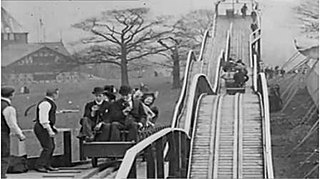
A Switchback Railway is an 1898 British short black-and-white silent actuality film, directed by Robert W. Paul, featuring patrons riding on a switchback railway at a fairground at Alexandra Palace, where Blandford Hall can be seen in the background. "This dynamically composed actuality," according to Michael Brooke of BFI Screenonline, "was clearly a success, so much so that James Williamson and the Riley Brothers released their own switchback railway films only a few months later." It is included on the BFI DVD R.W. Paul: The Collected Films 1895-1908. It is arguable that the filmmaker, R.W. Paul, missed a trick by not placing the camera inside one of the moving cars to simulate the ride from the passenger's perspective, although he might have had difficulty keeping the camera steady. Nonetheless, the film was clearly a success, so much so that James Williamson and the Riley Brothers released their own switchback railway films only a few months later.

Army Life; or, How Soldiers Are Made: Mounted Infantry is a 1900 British short black-and-white silent propaganda actuality film, directed by Robert W. Paul, featuring the King's Own Royal Lancaster Regiment riding over a plain. The film, which premiered on 18 September 1900 at the Alhambra Theatre in London, England, "is all that appears to remain of one of R.W. Paul's most ambitious projects," which, according to Micahael Brooke of BFI Screenonline, "had it survived in a more complete form," "would undoubtedly be considered one of the most important precursors of the modern documentary."




















